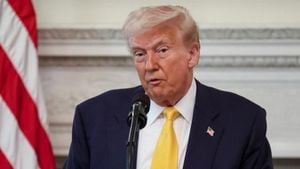Donald Trump's second presidency is shaking the foundations of global diplomacy as the former president embarks on controversial foreign policy actions, raising significant concerns among allies and observers alike. His decision to engage directly with Russia, as well as his inflammatory remarks about Ukraine and Gaza, suggest a major shift away from traditional diplomatic avenues and toward unilateral assertiveness.
Recently, it’s come to light how the U.S. has distanced itself from NATO and turned its back on Ukraine. A series of bilateral talks between American and Russian officials are reportedly being hosted by Saudi Arabia, completely sidelining both Ukraine and NATO allies from the discussions intended to address the protracted war in Europe. Trump, during these discussions, has gone as far as labeling Ukraine's President Volodymyr Zelenskyy as "kind of like a dictator now,” engaging in rhetoric that's alarming to many commentators. His unfounded claims suggest Zelenskyy bears responsibility for the onset of the war, comments noted by The Conversation.
Vice President JD Vance recently amplified the disconnect during the Munich Security Conference, where he minimized the threats posed by Russia and China, preferring to label liberal centrism as the real danger facing the West. This has sparked outrage across NATO partners, emphasizing fears about the alliance’s future credibility.
Meanwhile, Trump's musings about Gaza cause stirrings of international concern. During discussions with Israeli Prime Minister Benjamin Netanyahu, the former U.S. president suggested removing the Gaza Strip's current occupants to neighboring countries to create space for what he dubbed “a seaside resort.” Not only does this shift of rhetoric pose ethical and legal issues, but it also raises alarms over potential violations of international law, as real estate dreams echo sentiments of colonial ambition from historical frameworks.
Marking what some see as a disconcerting normalization of imperialistic threats, Trump's comments resonate with visions of similarly misguided expansions across other regions—eyebrows were raised particularly at his suggestions about territories such as Greenland and even Canada, both nations sharing intimate ties with the U.S. Disdain for international rule has become apparent, with Trump showing little regard for the sovereignty of allies.
Countries like Canada now face new realities under the looming shadow of Trump's unpredictability and ambitions. Prime Minister Justin Trudeau has publicly warned of Trump’s intentions saying these discussions are not merely rhetoric but could signify serious threats to Canadian sovereignty. Such proclamations reinforce the perception of the U.S. shifting toward aggressive nationalism at the expense of collaborative global efforts.
Even as Europe rallies behind Ukraine, with various leaders planning visits to Kyiv to support Zelenskyy, the absence of the U.S. from this collective effort sends ripples of distrust through the alliance. Spanish Prime Minister Pedro Sánchez, along with EU leaders like Ursula von der Leyen, are stepping up their commitments to Ukraine, underlining the stark divide growing between Trump and his former allies.
The unique geopolitical position of the U.S. makes Trump’s presidency particularly perilous; his lack of decorum toward foreign relationships has crystallized fears of America's role as the unwitting destabilizer of established alliances. Observers have noted the alarming reduction of diplomatic norms fosters uncertainty about the global order as it drifts toward untested waters.
Trump’s dismissal of previously respected international laws and norms has led many to view his administration's actions as increasingly insular and self-serving, undermining decades of efforts to maintain collaborative relationships founded on mutual respect and shared values. The stakes have been raised, and international observers are left grappling with the real dangers posed by the current U.S. administration.
The alarming consequences of these geopolitical maneuvers reflect not just on America's global standing but risk beefing up hostility and division among nations historically allied under the banner of democratic principles. Trump's transactional approach, especially after his return to power, signals not merely isolation of America but could herald the dawn of aggressive posturing against nations relying on U.S. influence for stability.
Indeed, the transformation of the U.S. under Trump may be seen as the genesis of new challenges, particularly as America’s closest allies, such as Canada and members of NATO, must recalibrate their strategies to operate within this newly defined international order. The dialogue and collective commitment shown by European leaders signal attempts to stand together, yet the void left by the U.S. raises the question of whether this will be enough to sustain the unity needed to combat mutual threats.
With the future still uncertain, and international law being upended by alarming rhetoric and policy shifts from Washington, the international community is poised for change. Allies will need to analyze Trump’s actions closely and be prepared for responses reflective of their sovereignty and security needs. The common thread linking nations under threat is increasingly being recognized, and how they navigate this turbulent epoch will determine the course of global relations going forward.



